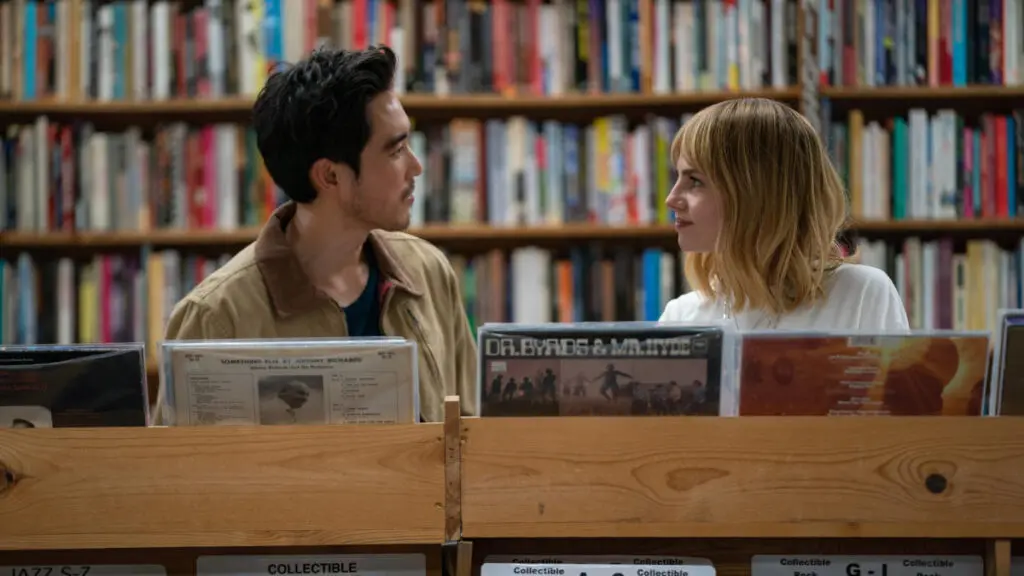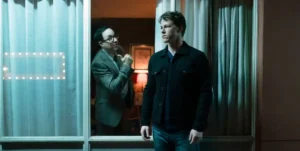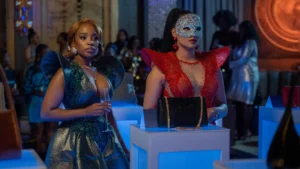It’s an absolute shame that the ending of The Greatest Hits is wrong. In fact, I’d argue it is morally wrong, and while Zack Snyder constantly argues for new cuts of his films, maybe there’s a case here for a rewrite and re-release. Quite simply, the conclusion to this movie unexpectedly irritated me. But to explain, I’ve detailed what the ending of this movie entails to reach a broader point.
Can Harriet Travel Back in Time?

Lucy Boynton as Harriet in The Greatest Hits (Credit – Hulu)
The obvious question that’s rife throughout the movie is whether Harriet can actually go back to the past and change things in the present. The audience never really knows whether Harriet is suffering seizures related to trauma every time she hears a song that reminds her of Max or whether the songs launch her back to a specific point in time.
She proves to David at his family’s antique store that she can change the present by going back in time. It is as if, by fate, Harriet has visited the antique store before with Max and crossed paths with David (hence why she finds David familiar). Reluctantly, David allows Harriet to test her theory; when she travels to the past, she leaves a note on an old school desk. In the present, David finds the note in the same place, which says, “Hummingbird.”
David is understandably shocked by the revelation that Harriet can time travel via specific songs and wants to find a way to save his parents. Unfortunately, as Harriet makes him aware, that’s not how it works. Only Harriet can do it, which makes the rest of the story irritating, especially with David having no choice.
How Harriet Saves Max
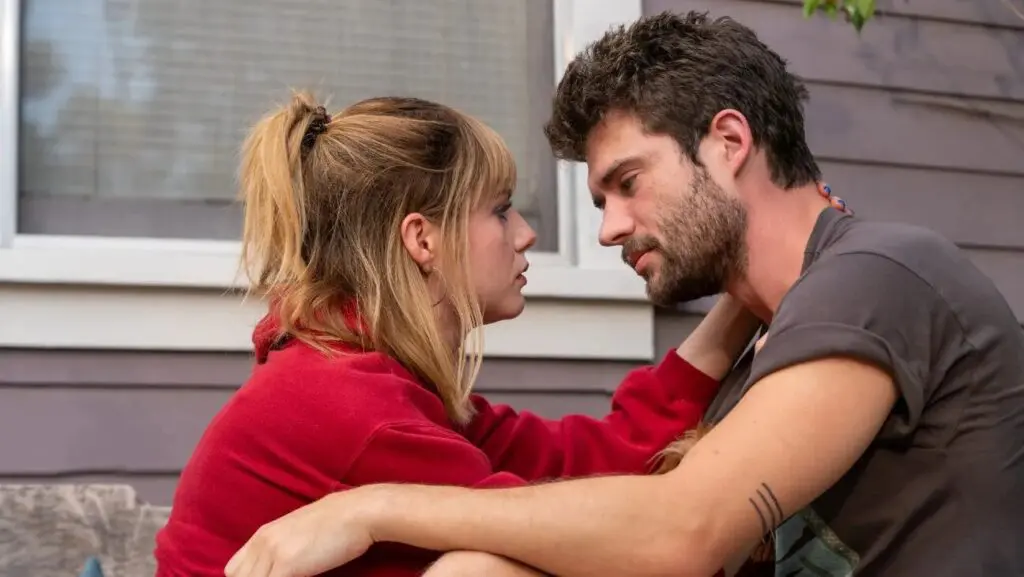
Harriet, played by Lucy Boynton (L), and Max, played by David Corenswet (R), in The Greatest Hits (Credit – Hulu)
And this, unfortunately, is where the story collapses entirely and spoils the good performance by Lucy Boynton. When Harriet goes back in time again, she poses a hypothetical question to Max: If not being together from when they met means Max did not die, would he still have a relationship with her? Of course, Max is stout in his answer — he confidently says he would always want to be with her. However, when the scenario is flipped, and it means Harriet is dying, he would not be with her for the sake of her living.
So, in the present day, Harriet, with David barely agreeing, decides she will save Max by changing the past. She also theorizes that it means they will not meet each other, as the timeline will be altered. They will forget each other and not have this new blossoming romance. Harriet goes back to the day she met Max at a musical festival. Instead of allowing their romance to blossom, she rejects him.
And so, the rest of the movie is a changed timeline. Harriet does not remember David or Max in the present day. She crosses paths with Max, but he has an entirely different life.
As the movie ends, predictably, Harriet bumps into David at a concert, and they find each other familiar. The film does not conclude what happens next, but for the sake of the audience and the hopeless romantics, we can assume they spark their romance again. They were “destined” to meet anyway, regardless of whether Max died.
The ending of The Greatest Hits is just wrong – here’s why
I probably will be accused of being a grumpy, 30-something man with this, but the ending of The Greatest Hits is wrong because this is not how life and the theory of this science work. Time travel is not meant to be a simple course correction with zero consequences. Writer and director Ned Benson is clearly one of those people who gets upset when his favorite couple does not get the ending he wants in a movie or TV show. In doing so, he decides to throw the concept of time travel out of the window for his own personal benefit.
I hate to say this, I do, but people die. It’s a part of life. It has to happen. There’s absolutely nothing we can do about it. Yet The Greatest Hits feeds into the Western taboo that we should act like death does not happen. It feeds into the idea that grief should not be healthily handled.
Throughout the movie, Harriet struggles with her grief. She spends nights going back in time and meeting her deceased partner in the past and reliving moments with him. Knowing this is not healthy, she attends a grief counseling group. So, what’s the point of her dealing with grief if the film does not address it? Addressing it by cheating time is not a salient message at all. It’s absolute crap.
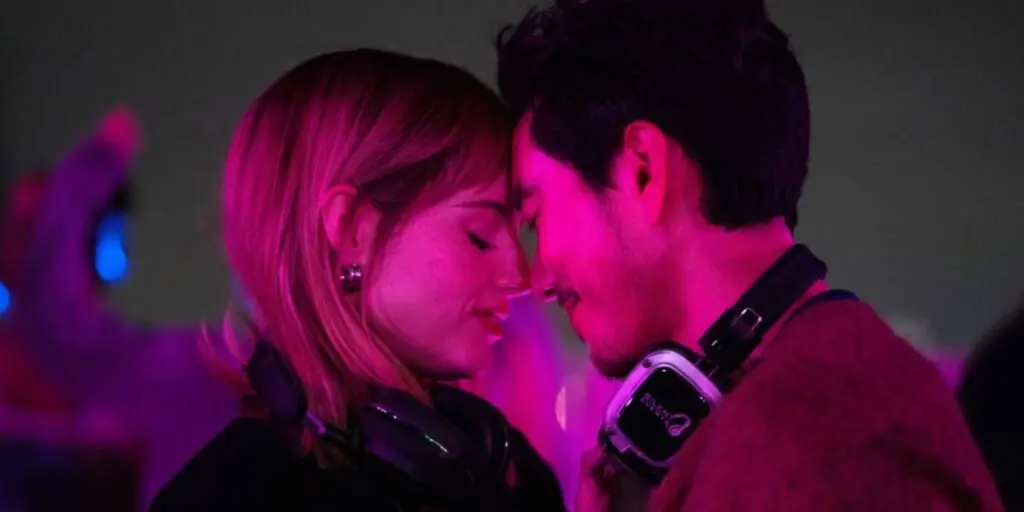
Harriet, played by Lucy Boynton (L), and David, played by Justin H. Min (R), in The Greatest Hits (Credit – Hulu)
Also, I find the entire scenario a representation of our growing narcissistic generation that believes they are privileged to do anything as long as it “feels” right, and in this case, even time travel. Harriet gives neither choice to David nor Max for the natural outcomes in life. Max doesn’t get to have his natural death, which could result in something far worse in the future, and David, who has clearly fallen in love, does not get to choose whether he continues his natural relationship with Harriet.
Harriet is the chooser of love and death — and she does so while barely caring.
Why do you think Final Destination is a thing? Why is Walter in Fringe punished for changing the timeline by kidnapping his alternate son from another universe? Why are we not allowed to have our favorite Gamora back after she dies in Avengers: Infinity War, despite time travel in Endgame? Why does time impact the characters and their time with their families in Interstellar?
Because manipulating time is not meant to be natural, it’s not meant to be human. There are supposed to be consequences. Harriet has the best of both worlds: she never meets Max, so he does not die (when he was supposed to anyway), and she still manages to find David.
It is quite possible that in the grand scheme of things, this movie will not be important, but it feels like a preview of what’s to come. When did we become so cowardly when it comes to telling stories?
I shared my thoughts on the movie overall in my review of The Greatest Hits.
RELATED:

